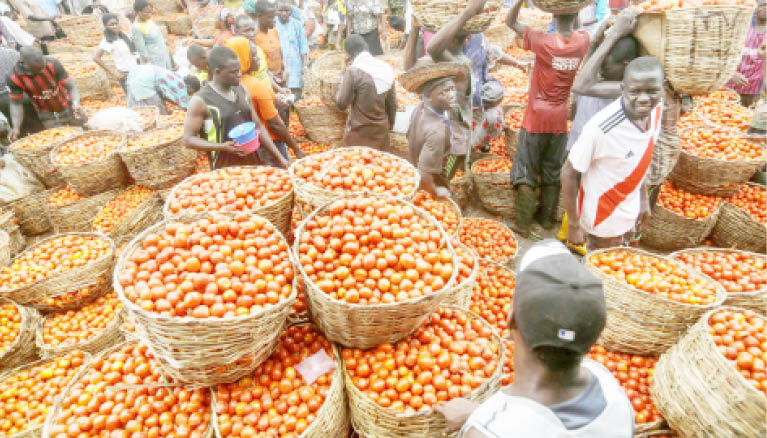Tomato production deserves more attention
In what is becoming a recurring problem, housewives, restaurant owners and Nigerians generally are once again struggling with the high cost of tomatoes in many parts of the country. According to a survey by this newspaper, the price of a basket of tomatoes in the producing states like Kano, Katsina and Benue, has risen from […]

People selling tomatoes in the market
In what is becoming a recurring problem, housewives, restaurant owners and Nigerians generally are once again struggling with the high cost of tomatoes in many parts of the country.
According to a survey by this newspaper, the price of a basket of tomatoes in the producing states like Kano, Katsina and Benue, has risen from between N17,000 and N20,000 to about N40,000 and N45,000. But in some states like Kwara, Oyo, Rivers, Lagos and Enugu, the price has risen to as high as N70,000 per basket.
To many households and restaurants, the current price of tomatoes is going beyond their reach, forcing them to resort to tomato paste, which price is also going up.
Traders and farmers attributed the hike in the price to the recent pest attack in some farms across many tomato-producing states. A large number of tomato farms have reportedly been destroyed by Tuta absoluta, a popular pest that can destroy a tomato farm in a few hours.
NEWS EXTRA: Dangote came to Lagos with nothing 45 years ago – Sanwo-Olu
NEWS EXTRA: Factional Labour Party Chairman returns to tribunal without his cap
In what is becoming a recurring problem, housewives, restaurant owners and Nigerians generally are once again struggling with the high
“The Tuta absoluta has done a lot of damage to tomato farming and we must face this challenge now. In one hour, the pest can destroy five hectares of tomato. Another issue is, yet we don’t have water-resistant tomato seeds. People are afraid of tomatoes this season because rain is about to set in. If we plant tomato now, it may likely not grow as we want because rain will soon drop and it will affect it,’’ a farmer who did not want to be named told this newspaper.
The Executive Director/Chief Executive Officer, National Horticultural Research Institute (NIHORT), Dr Ephraim Nwanguma, said at a workshop last year that Nigeria was the third largest importer of tomato paste concentrate in Africa. “Nigeria currently produces 2.3 million metric tons as against the 1.8 million metric tons produced two years ago while the national demand is three million metric tons”, Nwanguma said.
He added, “Nigeria is the 14th largest producer of tomatoes in the world, second in Africa, and accounts for about 65 per cent of all tomatoes produced in West Africa. Despite the aforementioned potential of tomatoes, Nigeria imports an average of 150,000 tons of tomato paste concentrate annually, valued at about $170 million. Thus, the country is the 13th largest importer of tomato paste in the world and third largest importer in Africa.”
Agricultural experts said the current problem stemmed from failure to develop water-resistance tomato seeds which would enable farmers to plant during the rainy season.
They said the crisis would continue annually as past experiences had shown that seasonal production of the produce has been the major cause of the hike around this time.
The scarcity of such basic food items is a threat to achieving good nutrition among the populace. Tomato provides several nutrients to the body, especially vitamins A, C and K, and it is a major source of antioxidants and lycopene.
Tomato production is also an important employment activity that creates jobs, incomes and livelihoods for thousands of farmers and other agents involved in its input supply, production, processing, marketing and transportation.
It is indeed worrying that in spite of the country’s vast arable land, the existence of the River Basin Development Authority covering the country and 52 agricultural research institutes, local production still cannot meet local demand for a basic agricultural product like tomato.
Daily Trust, therefore, believes that the current crisis should be viewed as a threat to food self-sufficiency and the economic well-being of millions of farmers and others in the value chain. Government must take immediate steps to assist farmers affected by the pest attack to enable them to recoup their losses and get back to their farms.
But more importantly, our ministries of agriculture at federal and state levels, river basin authorities and the numerous research institutes must ensure that this does not happen again. We should be able to develop water-resistant tomato seeds to enable us to cultivate tomatoes all year round while seeking solutions to the recurring pest attacks. We must also be able to encourage tomato preservation so that it could be available throughout the year.
Furthermore, there is a need for a policy to encourage the growth and processing of tomatoes in the country. Many of the more than 100 companies involved in the business have closed down due to the importation of tomato puree from China and other countries which are cheaper. The federal government may need to reverse its earlier decision to allow the importation of tomato puree.
Governments, at all levels, must take deliberate steps to encourage farmers to take to tomato farming all year round and encourage a sound value chain that will ensure that their produce finds a ready market. This can be done through the granting of soft loans and introducing technology to farmers.
Tomato farming should be made into a full business as it is capable of turning around the fortunes of our farmers.
